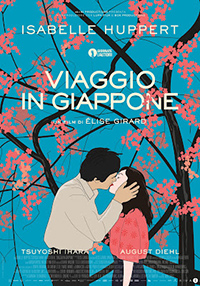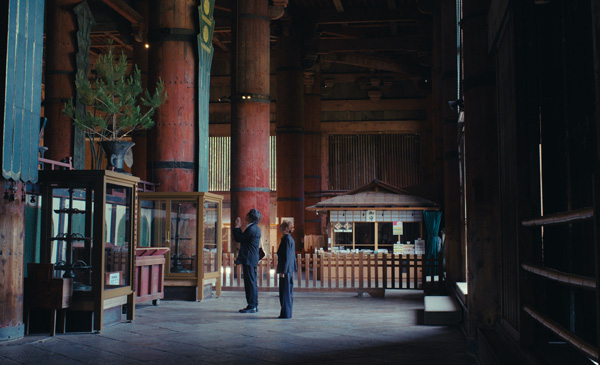Second Chance Romance: Girard Haunts Huppert in Erstwhile Ghost Story
Isabelle Huppert conjoins two of her most recent recurring cinematic themes with Sidonie in Japan, which showcases the legendary French actress in a foreign country while also being (this time, literally) haunted by the past. Headlining the third film from Élise Girard, Huppert becomes a stranger in a strange land while visiting Kyoto, Japan thanks to the republication of her first novel, L’ombre Portee (The Shadow Cast), which becomes more than just a metaphorical map to her current dilemma as a writer who no longer writes.
conjoins two of her most recent recurring cinematic themes with Sidonie in Japan, which showcases the legendary French actress in a foreign country while also being (this time, literally) haunted by the past. Headlining the third film from Élise Girard, Huppert becomes a stranger in a strange land while visiting Kyoto, Japan thanks to the republication of her first novel, L’ombre Portee (The Shadow Cast), which becomes more than just a metaphorical map to her current dilemma as a writer who no longer writes.
As Sidonie (Huppert) reluctantly travels to Kyoto, she is greeted at the airport by Kenzo Mizoguchi (Tsuyoshi Ihara), who also happens to be the publisher of her reprinted first novel, as well as devoted escort for the remainder of her trip. Slightly peeved at local customs, which Sidonie seems completely oblivious about, her series of interviews starts off without much ado until she suddenly sees her dead husband, Antoine (August Diehl) in a hotel lobby. Suddenly, more memories are dredged up from her first novel and she confides to Kenzo about the childhood trauma which led to her marriage, and allowed her the confidence to become a writer. In turn, Kenzo shares his own sad state of affairs as he’s currently separated from his wife, who he’s been unable to communicate with for some time. Slowly, their camaraderie begins to take on more romantic inclinations while Antoine keeps appearing, though his entity slowly begins fading away.

Notes of a lilting culture clash comedy guide us through the film’s first act, and by the time August Diehl makes his first of several transparent appearances, it would seem Girard is paying homage to the likes of David Lean in Blithe Spirit (1945) or Joseph L. Mankiewicz’s The Ghost and Mrs. Muir (1947), but the film’s playfulness slowly subsides with Sidonie’s growing attraction to Kenzo. Both of their past relationship conflicts seem to fit together like puzzle pieces, so their slow and tentative courtship makes sense as he shows her around various parts of the city in between interviews and book signings.
Eventually, the film evokes more familiar metaphorical similarities about Sidonie having to confront the past, and thus finally allowing it to dissipate. While not quite at the level of David Lowery’s A Ghost Story (2017), it evokes a similar sense of expiation, moving on from a mind frame where nostalgia and painful memories trap us. However, it’s the moments with Diehl which tend to stop the film’s energy dead in its tracks as well, instigating a repetitive cycle when our attention drifts towards the budding romance between Sidonie and Kenzo. Girard includes a striking montage of still photographs after their affair becomes physical, reminiscent of moments in Alain Resnais’ Hiroshima, Mon Amour (1959), an energy the narrative should have leaned into earlier. As Kenzo, Tsuyoshi Ihara (who many Westerners may recognize from Clint Eastwood’s Letters from Iwo Jima, 2006) is playfully reserved, but the script (with co-credit from Maud Ameline and Sophie Fillieres) could have used some more characterization for Kenzo. Additionally, the extreme trauma which has defined Sidonie’s life feels a bit underutilized considering how it relates to their deeper connection as citizens of a strange country thanks to their shared traumatic backgrounds.
As shot by Celine Bozon (who did something similar with Huppert and transpositions in 2017’s Madame Hyde), the film works best visually as a travelogue of Kyoto, while also showcasing a wide variety of swank hotel lobbies (Sidonie is almost constantly trying to escape these confines for ‘fresh air’). Thematically, there are some similarities with her recent film About Joan (2022), where a figure from the past instigates a cathartic trip down memory lane—-here the trip is paralleled physically and metaphorically, her Japanese idyll coinciding with her first novel, born from a familial trauma she only felt free to express because of her relationship with Antoine. But Girard also seems to be utilizing the actor in ways similar to Hong Sang-soo, particularly his 2012 homage to her with In Another Country.
For fans of Huppert, Sidonie in Japan is a chance to see the performer in an infrequent fashion as an awkward and vulnerable woman who finds unexpected romance. Girard leaves Sidonie in a comfortable yet ambiguous state, but the ponderous pace getting there suggests her ghostly paramour might have been the least interesting narrative accessory of all.
Reviewed on August 30th at the 2023 Venice Film Festival – Giornate degli Autori. 95 Mins.
★★½/☆☆☆☆☆


